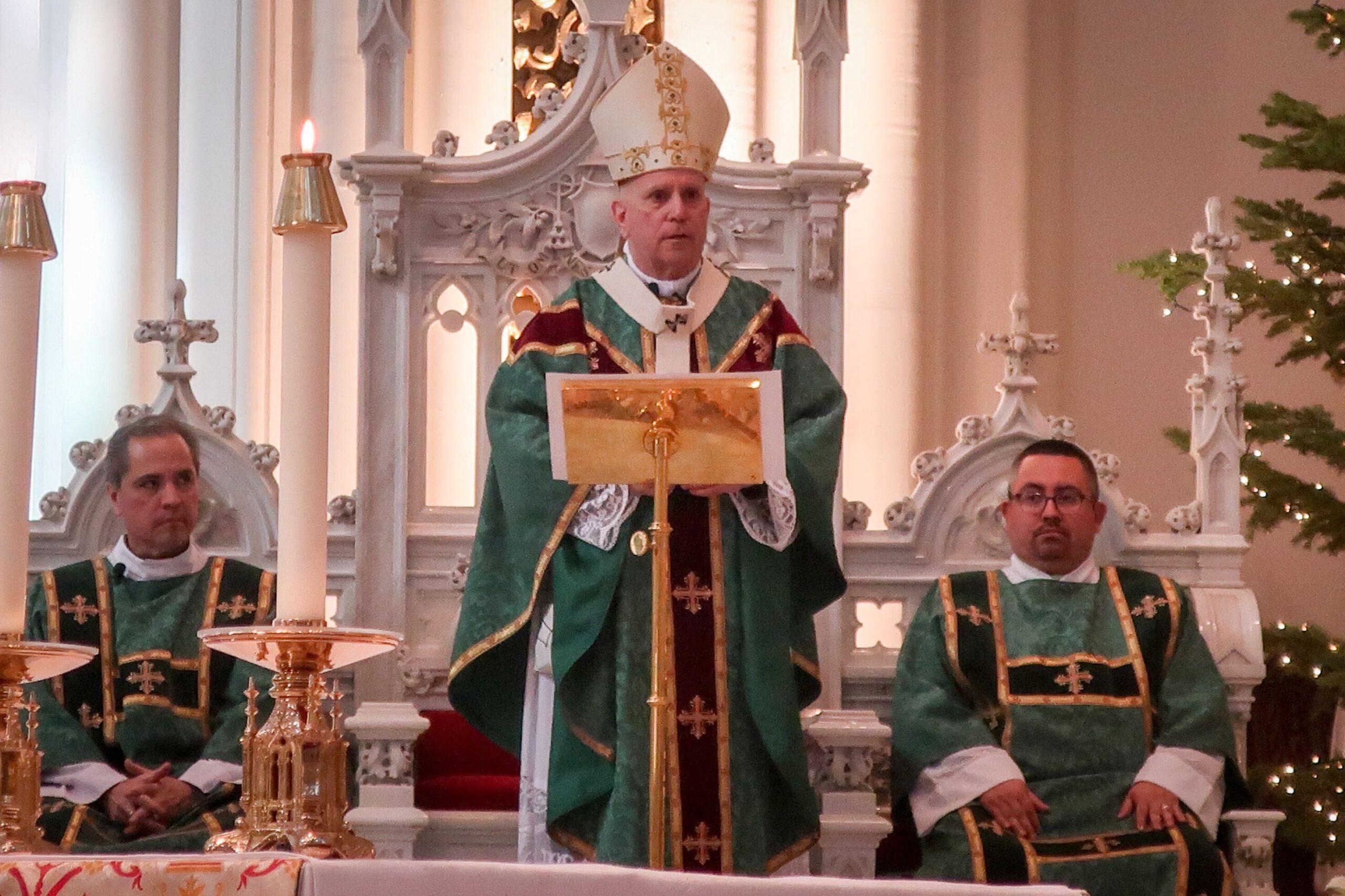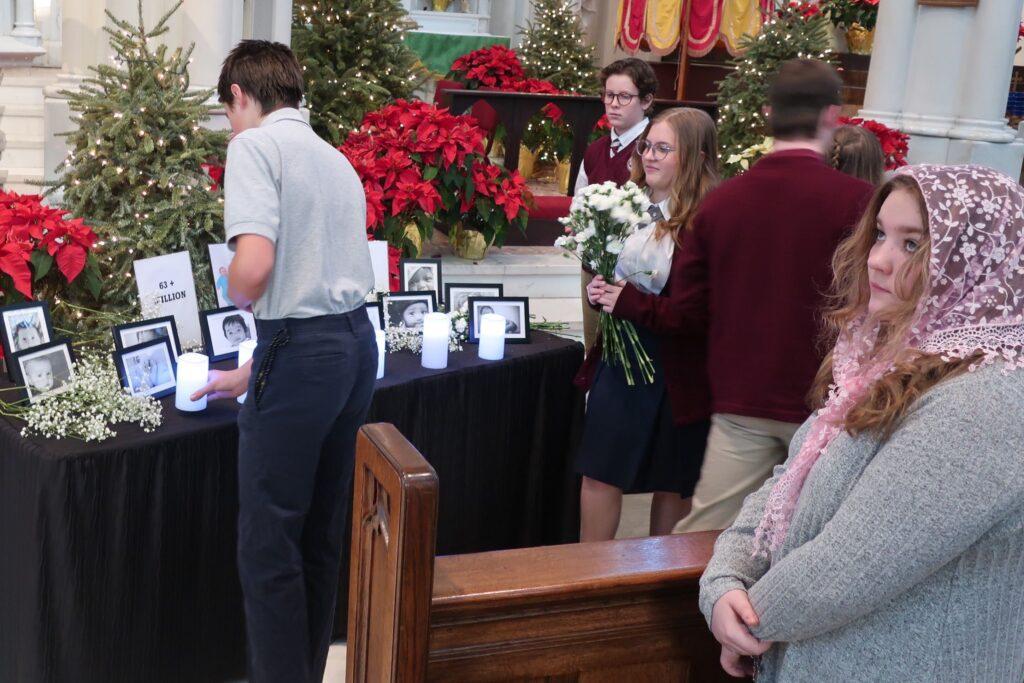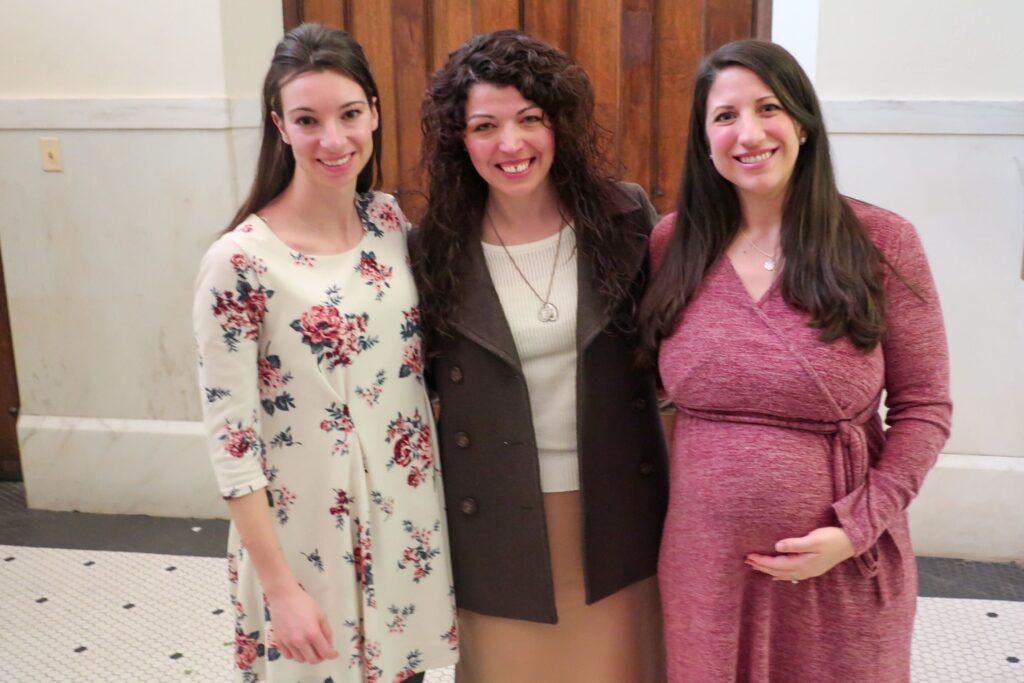
It's a cloudy Sunday at the Cathedral Basilica of Immaculate Conception in downtown Denver. Students from St. John Paul the Great Catholic High walked down the aisle with candles and flowers. They place them on a table to the right of the altar, where there are pictures of babies and signs in black, all-capital lettering reading “63+ MILLION” and “WE WILL NOT FORGET.”
The day marked 50 years since the Supreme Court case that legalized abortion in the U.S. It was the first time the Catholic Church commemorated the day since last summer’s Dobbs decision overturned the case. It was a major victory for the church and opponents of abortion.
The mood was solemn — this was a memorial Mass for the lives lost since Roe v. Wade became law in 1973 so they would not be forgotten.
Mary Vulcani felt that way while sitting in the Basilica’s vestibule before Mass.
“I think it is a more somber tone today. Obviously very spiritual, very prayerful,” said Vulcani, who is Dean of Students at Holy Family High School in Denver.
Denver Archbishop Samuel J. Aquila spoke about current media and culture and the impact on how women are perceived. He also threw in a Kardashishians reference to prove his point.
“When you look at people like the Kardashians, and this is what a woman is supposed to look like,” Aquila said. “The media plays it all up and then young women are looking at themselves and saying, ‘I don’t look like that at all.’ There must be something wrong with you. My daughters, you are beautiful. You are beautiful in the eyes of God.”
He called on Catholics to change their perception of women.
“Do we look at other human beings with their innate dignity? If everybody looked at one another with that awareness, there would be no abortion. We have allowed the culture to court this,” Aquila said.
Catholics account for 16 percent of Colorado’s population. That’s according to the Pew Research Center. Nationally, Pew found that a majority of Catholics believe abortion should be legal in some cases, despite church doctrine that considers abortion immoral.
Last year, the U.S. Supreme Court overturned Roe v. Wade and Planned Parenthood v. Casey. It allowed states to set their own laws on abortion, many of which enacted full or partial bans on the procedure. Colorado did the complete opposite.
Months before the repeal, Gov. Jared Polis signed the Reproductive Health Equity Act, which assured the protection of abortion rights in Colorado.

Abortion-rights opponents have said the state would become a destination for the procedure. The numbers back up that assumption. Colorado saw a 125 percent jump last year compared to 2021 in patients traveling from out of state for abortion care, according to provisional data from the state health department.
“That's really heartbreaking for me to think the state I live in is a place that people are coming to end the life of their unborn child,” Vulcani said. “So, that's a very sobering thought. And again, it isn't just about changing the law. It isn't just about overturning Roe versus Wade. We have to actually change people's hearts.”
The Colorado Catholic Conference, which represents the state’s four bishops, believes Colorado’s law opened the door for the expansion of abortion rights.
“They've already made it very clear that they're going to try to increase abortionists moving to the state of Colorado. We haven't had a clear message on what that's going to look like in terms of legislation," said Brittany Vessely, executive director of the Colorado Catholic Conference. “We fully anticipate many of the life bills dying, almost all the life bills dying because of the progressive majority that's radically pro-abortion.”
The four Colorado bishops responded with an open letter asking Catholic lawmakers who voted for the bill to refrain from taking communion.
Catholics with anti-abortion rights views from other states have also noticed the difference in Colorado’s culture around reproductive rights.
The issue hits home for Carrie Nolan. The former school teacher and vocal performer previously lived in Oklahoma, which has some of the nation’s most restrictive abortion laws. She said her mother had an abortion before her parents met.
“My mom did tell us this when we were young that she had an abortion and she regretted it very deeply,” Nolan said.
She said she regrets it, too. Nolan has eight siblings and wishes she could’ve met a ninth.
“Even if she'd had the child and given them up for adoption, I would try to find that person because I would want to know them because they're my blood. I want to know who they are and I never got that chance.”
Last summer, Nolan moved to Colorado and works as a medical assistant. She has done some election work and spoke to people about the issue. Nolan thinks Colorado has more abortion rights supporters than any state she has ever lived in.
“I was just getting their opinions and listening to them,” Nolan said. “They couldn't understand that I was a woman and pro-life. They thought that it was weird. And I think it's weird that women think that it's a good thing that they should take a very incredible ability that they have, which is to have a child, to have another human being and just throw that away and not consider that an honor and a responsibility that is beautiful and actually should be really protected.”
Lorina Clemence agrees.
“Colorado, especially in Denver, I do find that there's a very concentrated group of strong young adult Catholics. However, the state and the city, especially as a whole, is more liberal,” Clemence said.

Clemence, who is also a former teacher, grew up Catholic and lived all over the country because of her military family. She said she rebelled against her faith during her teenage years. But, she reverted back during her sophomore year of college.
Clemence moved to Colorado a year and a half ago and works for a nutrition company. She said she’s proud of women who chose to keep their children.
“I have a few friends who have had children at very young ages like 17 years old in high school,” Clemence said. “And the fact that they were able to make that decision and commit to something like that, a very life-changing decision that requires a lot of responsibility.”
For Catholics like Nolan and Clemence, Colorado’s abortion access laws aren't a roadblock. They plan to continue the fight against legal abortion in Colorado.
Vessely said the Colorado Catholic Conference will continue to offer alternatives to abortion through ministries and pregnancy centers.
“The Catholic Church continues to offer a continuum of care, both pre- and postnatal for families throughout their lifespan also psychological help as well, counseling and material help through diapers and clothing and food sources,” Vessley said.
Clemence plans to volunteer at one of those centers and hopes to make an impact.
“Women in Colorado need to know that they're loved and that they're supported and that they can do this,” Clemence said. “And I look forward to so many women making the hard, sacrificial choice to keep their child and the fruits that will come of that.”









